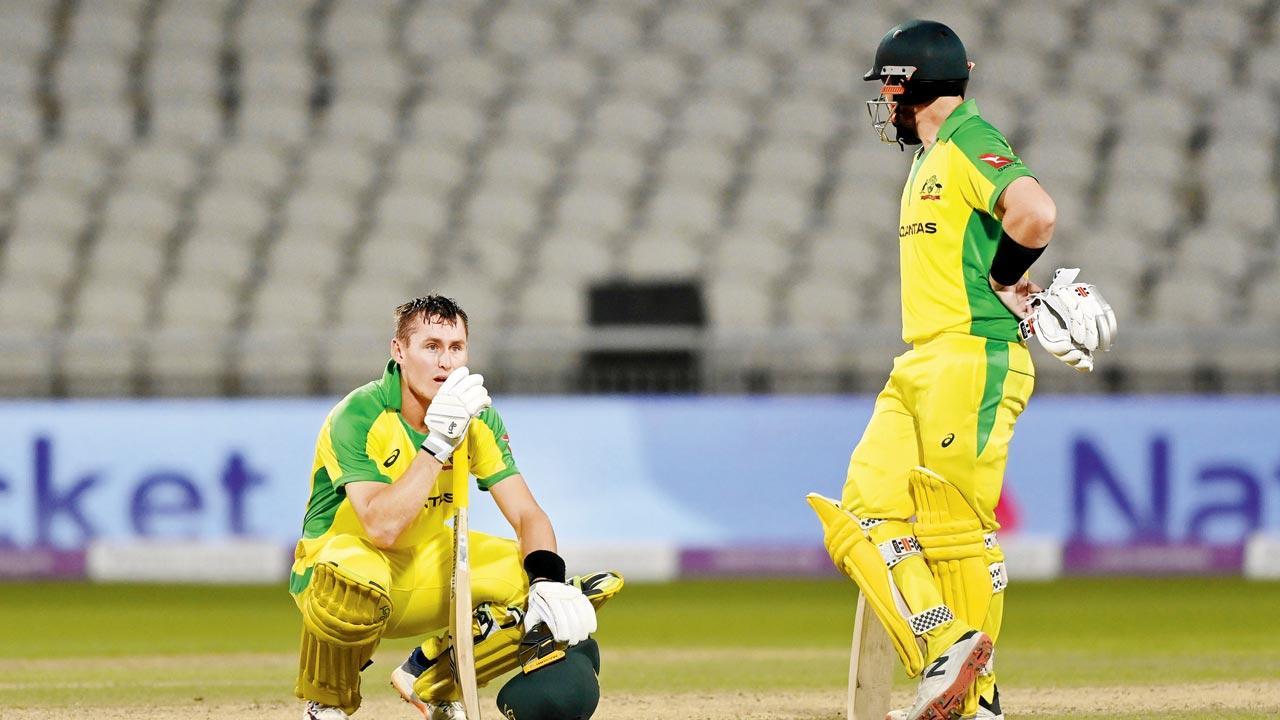I’m a big fan of taking the referral system away from players and putting it in the hands of the umpires. No limit to referrals, just ask for clarity if unsure

Australia’s Marnus Labuschagne (left) waits with Aaron Finch for the DRS decision during the second Royal London One Day International Series against England at Old Trafford in 2020. Pic/Getty Images
 “Often your brain makes you believe, what you see is truly real, even when it is not.”
“Often your brain makes you believe, what you see is truly real, even when it is not.”
Abhijit Naskar Cricket, governed by commercial decisions that override the best interests of the game, is a victim of the tail wagging the dog. The T20 World Cup will most likely be decided by a DRS verdict (or non-verdict) that will boil down to the ICC feeling the pressure of trying to fit matches into a tight TV scheduling window.
Take right call, not quick one
The integrity of making the right decision should never come at the expense of an artificial commercial deadline. One of the reasons for capping DRS referrals is to ensure the game doesn’t extend past the scheduled TV deadlines. Are we more interested in making the right decision or the quick one? If this principle was applied to a court case or aircraft safety, would we accept a time deadline as a valid excuse for the wrong outcome?
When Australia were defending a paltry 141 against Zimbabwe recently, Aaron Finch burned both his reviews on poor calls because he was (understandably) desperately trying to clutch at straws. This was NOT what DRS was intended for—hoping that marginal decisions might go your way when the game is on a knife’s edge.
Also Read: Zimbabwe score historic ODI win against Australia
It was designed to eliminate the howler, the odd decision when the umpires completely got it wrong.
Later in the innings, Ryan Burl edged one to the ’keeper but Australia had run out of reviews because of this arbitrary notion of only being allowed a certain number of referrals.
You see it all the time. Players looking aghast when they have run out of referrals and the big screen shows the clear edge or the ball missing leg stump. Whilst this is clearly an umpiring error, players need to realise that the reason they were out of bullets, metaphorically speaking, was they themselves had made errors and lost their DRS referral quota.
I’m a big fan of taking the referral system away from players and putting it in the hands of the umpires. No limit, just ask for clarity if you are not sure. And occasionally live with an honest mistake when they don’t refer a clear edge or one that’s sliding down leg.
Go the poker way
If the captain wants to take the risk of questioning the umpire, like playing poker, it will potentially cost him to see what cards the umpire is holding! Players will adapt—they might now start treating DRS for its intended purpose—to correct an egregious error rather than a dying man clutching at straws.
Michael Jeh is a Brisbane-based former first-class cricketer
 Subscribe today by clicking the link and stay updated with the latest news!" Click here!
Subscribe today by clicking the link and stay updated with the latest news!" Click here!










